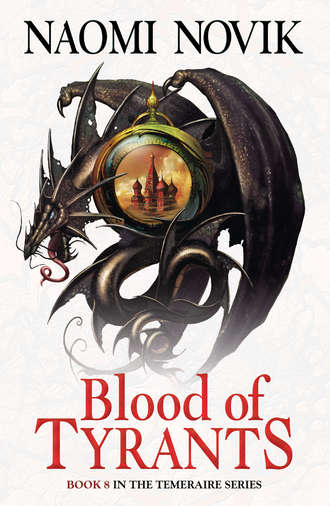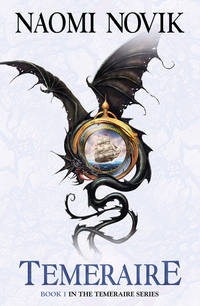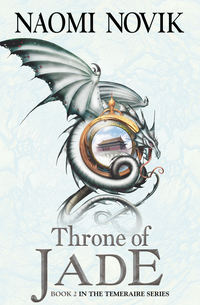
Полная версия
Blood of Tyrants
“I cannot account for such an assault, sir, save by some grave misunderstanding, or if intended as an action against Dutch shipping in your harbor,” he said, troubled. “They are French allies—”
“More excuses,” Matsudaira said, cutting him off with a slash of the hand, and then Junichiro returned in haste, nearly running, to report the sword missing and launch a new uproar, which Laurence almost welcomed as distraction from the questions he was unable to answer even to himself.
“If I have taken it,” Laurence said, when they demanded its hiding place, “in doing so I have only been taking my own again, and I do not consider I owe you either apology or explanation in such circumstances. Nor could you rationally expect me to hand it back; yet if I should deny having it, you would call it a lie. I must beg to be excused: I have nothing to say upon the subject.”
He had already decided to say as much, if he were questioned. He thought only a thorough and systematic search of the grounds would uncover his bundle: the ground outside had been trampled by too many feet, since his abortive escape the previous night, to show any trace of his actions.
Matsudaira was by no means conciliated by this reply. “We will see what you have to say when you have been more rigorously questioned,” he said angrily. “I will send for a torturer at once—”
Laurence did not flinch, but regarded him with the flat disdain that any such threat merited. “You may question me as you wish,” he said. “I have not lied; and I hope I can answer you and die like an Englishman.”
To his surprise, however, Lady Arikawa raised her head and rumbled, low, making an objection. “I do not think that necessary yet,” she said, a thin translucent ruff around her neck frilling out.
Matsudaira sat up a little further, with rigid shoulders, and said grimly, “I must with the utmost respect disagree, Lady Arikawa.”
Laurence could not argue with the man’s courage, at least, to so incite a dragon to anger; Lady Arikawa might easily have seized and broken him like a toy without even rising to her feet, and by the swift slitting of her eyes seemed tempted to do so.
“You are charged to carry out a full investigation,” Lady Arikawa said. “We have yet no word from Nagasaki regarding any English vessel in the harbor, nor have the Kirin returned from their survey of the coastal waters, near-by. Surely we can wait for this intelligence to reach us before proceeding.”
“The foreigner is certainly condemned by the law, regardless,” Matsudaira said, after a moment. The grey dragon’s wings flared from her back, unsettled, and folded again; the clawed tips shifted back and forth, restlessly.
Sitting beside Matsudaira and sipping tea, Kaneko had shown no expression but level calm all the while; now he said quietly, “My lady, I most deeply regret my error, and—”
“That is enough,” she said, interrupting crisply. “What error can there be in the will of the heavens? Certainly it is only a great service to the bakufu that this barbarian is available to be questioned about these matters; it may be that much benefit to the nation may derive from his rescue. It would be a great impiety upon our part to disregard the means by which the gods have delivered him into our hands, through this vow which caused your eyes to light upon him where he lay in the road. If they did not intend him to be well-treated, they would not have arranged matters so. I cannot agree to a course which despises so clear a sign from the spirit world.”
She delivered these arguments with an air almost of triumph. Laurence thought he detected in them rather more sophistry than true religious fervor. He remained unable to follow all the undercurrents, but he gathered at the least that she wished to spare her vassal Kaneko whatever embarrassment he might suffer at being forced to renege on his vow of assistance. Laurence could only suppose that embarrassment to have consequences more extreme than he imagined.
Matsudaira did not seem persuaded, but at least her vehemence gave him pause; he said more cautiously, trying to answer her in the same lines, “And yet as a magistrate, I must pursue my duty to the law by every means: the gods would not have delivered him in ignorance of so commonplace a fact.”
“The gods would certainly not have expected you to disregard their wishes,” Lady Arikawa returned, with scorn. “Which indeed, they may have meant as a warning. Consider: it is well-known that men of other races are weak. The torture which brings truth from a Japanese may perhaps even slay a Western barbarian, and deprive us of further information.”
Laurence derived some black humor from the burst of indignation he instinctively felt at the nonsense of being any less fitted to endure pain: a fine and absurd thing it would be, to make a case for his own torture. However, the argument was ill-chosen on Lady Arikawa’s part; Matsudaira and Kaneko could not forbear a doubtful glance in his direction. Laurence was a head taller than any other man in the room, and he could have given any of them thirty pounds or more.
Of course, from Lady Arikawa’s perspective—near enough to twelve tons, Laurence would have guessed—the distinction was all much what like. In any event, Laurence closed his mouth on any retort he might have made, and stood wooden beneath their gaze; the weaker and more helpless they chose to think him the better, if they should set a commensurate guard upon him.
“It perhaps would be wise to employ a truly skilled practitioner,” Matsudaira said, after a moment, in a conciliatory manner. “I will send to Edo for a specialist in questioning the sick and the elderly. That will necessitate a certain delay, of course. Perhaps in the intervening time, further intelligence will render the questioning unnecessary, or the foreigner may think better of his lies and confess freely.”
Lady Arikawa inclined her head. “It will be convenient for you to keep charge of him here at Kaneko’s house, in the meantime,” she said—a rather strong hinting, there, and Matsudaira did not attempt to argue with her, but bowed his head in agreement.
Two guards were called in: Matsudaira’s men, Laurence thought; they wore signs of authority matching his own. They escorted him, but only back to his original chamber; and there was a tray of food set on a low table in the middle of the floor. Laurence did not hesitate to devour it, and then lay himself down on the straw mat to consider and to rest.
He roused from a half-sleep a little while later; there were voices, coming faint but audible through the walls, and speaking Chinese: Lady Arikawa, and Kaneko with her. “There can be no more honorable fate than to die in the service of Japan, even for a barbarian,” she was saying, in an anxious tone, low: Laurence could only surmise she preferred not to be overheard by the servants of the house. “Surely in delivering him to such an end, you will have assisted him?”
Kaneko did not immediately answer her, but then said, gently, “Most honorable lady, I regret to disappoint you. I vowed that whomever I found upon the road requiring assistance, whether a beggar or a digger of graves, I would serve him as I would my own grandfather, with honor. To see him dispatched as a low criminal—” He trailed off, and said no more.
“Oh!” Lady Arikawa said eagerly, “but that need not be so! I will speak with the magistrate. Why should he not be permitted seppuku instead? And then indeed you will have served him.”
Laurence heard no more of the conversation: the heavy crunching tread of the dragon faded, as though they had wandered away through the gardens. The guards were sitting together at the far end of the chamber speaking in low voices over cards: some sort of game of chance. They were armed with short but serviceable blades, and wore a kind of light, handsome armor, crafted of small plates of wood which overlapped one another neatly.
They rose to attention when Kaneko ducked into the chamber, a short while later, and bowing deeply left the room when he dismissed them. Laurence had been engaged in exercising his right arm, which was yet bruised all along its length with markings as of chain links pressed hard against the flesh. He had the movement of it back, however, and he thought he had worked it limber. Laurence did not rise; he had already managed to crack his head on the ceiling several times, and if the King did not require his officers to rise for the loyal salute on board ship, in similar conditions, Laurence was damned if he would do it for his jailor, here.
Kaneko settled himself on the ground with easy grace and regarded Laurence somberly. “I have come to speak plainly with you, Englishman,” he said.
“That, sir, cannot be anything but welcome,” Laurence said, without much enthusiasm; he had heard enough of the conversation in the garden to guess at Kaneko’s intentions: the man was looking for some means of eeling out of his vow, Laurence supposed, and meant to offer him some mean and cowardly alternative to death—imprisonment for life, perhaps, or a kind of indentured servitude.
Kaneko said, “Even if the bakufu had not decreed the death of all foreigners entering the nation without permission, the circumstances of your arrival would be dark. The shameful offense of your country-men in Nagasaki suggests a false character, and a league between your nation and China has been suspected for several years, now. Your ships have been reported in the northern waters near Peking, where no Westerners formerly were welcome—”
The existence of this traffic came as news to Laurence; so far as he knew, only the port of Guangzhou was open at all. “—and now, this appearance of a Celestial, in conjunction with yourself, and this British dragon you have mentioned,” Kaneko continued, “more than confirms our most extreme suspicions: the Celestials travel only with the Imperial family.”
Laurence could not disagree that such commerce indicated a more intimate connection formed between Britain and China than he recalled; this, however, pressed the bounds of credence. “I should be astonished beyond belief to learn that a member of the Imperial family of China were traveling with my ship. I must continue to believe it more likely that your witness, faced with unfamiliar beasts, mistook some rare British breed for the one you name.”
“There is no mistake,” Kaneko said. “Lord Jinai is the guardian of the West: he is four hundred years old, and he has seen Celestials before. He was not mistaken.”
He spoke flatly, and Laurence did not propose that advanced years might render Lord Jinai’s judgment questionable: he remembered too vividly the sharp, deadly look of the sea-dragon’s eyes; no signs of creeping age there.
Kaneko added, “And your party have not only stolen timber from our shores, but attacked him: so pronounced an insult cannot be anything but deliberate.” He paused, and after a moment said, “You seem a rational man, and though your conduct is not correct, I imagine you are an honorable man, in your own country. Will you offer no explanation?”
Laurence would have liked to pace. He would have given a great deal to be on his quarterdeck, with the sails belled out overhead and wind in his hair, even just long enough to think his way through all the tangled evidence. Failing that, he would have been glad of a pot of strong coffee and a day of quiet—a chance perhaps to write out a letter to Edith Galman; he had often found the exercise to resolve his own thinking, when he had no trusted confidant to hand, as a sea-captain rarely might. Edith—he had a start for a moment; he had not thought of her. He looked at his hand, as yet without a ring.
He pushed that from his mind. He could not allow himself to dwell on such matters now. “I may as well be hanged for a sheep as for a lamb,” he said aloud, in English, to himself, and steeling himself for incredulity, gave Kaneko to understand his loss of memory, in as succinct and unadorned a manner as he could.
Kaneko listened to his brief narrative with mingled bewilderment and suspicion; he asked a few questions only, in tones of extreme politeness, which Laurence ruefully feared covered equally extreme skepticism. “You do not recall why you are here,” Kaneko said at last, “nor anything of an alliance between your nation and China.”
“Whatever injury I have taken has robbed me of more than that,” Laurence said. “I have lost years—how many, I cannot be sure, but certainly two or three. I do not suppose, sir, you can tell me what year it is, in the European reckoning?”
“By the latest report of the Dutch, they make the year 1812, if my recollection is not imperfect,” Kaneko said, and Laurence stared at him, taken aback in real horror: eight years gone?
He looked away at once, but his distress, which he could not easily master, had at least some small beneficial effect: Kaneko was frowning at him, puzzled but a little more convinced, when Laurence managed to overcome his immediate feelings.
“If I may further trespass,” Laurence said, “can you tell me anything of the war? Has Napoleon been defeated?”
Laurence tried as best he could to keep his spirits from sinking entirely, as Kaneko sketched for him the Japanese understanding of circumstances in Europe. Their news was certainly old, and as it came entirely from the Dutch also certainly colored by that nation’s self-interest; it had been translated at least twice, and surely much was lost, in the way of nuance.
So he told himself, and Britain at least was free. Laurence clung to that, for what consolation it might be while hearing of Austria fallen, Prussia—Prussia!—fallen, Spain fallen, Russia half-allied with France—the shadow of the tricolor over all of them. Kaneko did not seem to know what had happened in the Netherlands, but Laurence could hardly imagine they had escaped, no matter what the Dutch representatives here might have said. Napoleon was the master of all Europe.
“I can well believe, sir, that you find my explanation difficult to swallow,” Laurence said, when he could speak again, “for I can scarcely believe it myself; I have withheld it so far for that very reason, having no desire to figure either as an honest lunatic or a witless liar. But I have told you the truth, and you have served me a very heavy blow; I beg your pardon, but you could scarcely have given me worse news.”
His voice failed him, broke, and he did not speak again. Kaneko also said nothing, so they sat together in silence, caught in their own private and separate distress, though by chance entwined. The sun was lowering. A branch outside cast a dappled silhouette upon the rice-paper wall, which lengthened little by little as it traveled over the wall. Soft footsteps moved through the hall outside now and again, the shush-shush of sandaled feet; the guards in their creaking armor shifted their weight on the other side of the panel.
At last Kaneko said, “Perhaps I am being foolish, and yet I do believe you. However, I cannot expect the magistrate to do so: indeed, it could scarcely be in keeping with his duty to do so. Nor would this explanation excuse you. A man who, out of his senses, commits a crime, is still guilty: and lacking memory of your own intentions, you cannot even defend them.”
“Sir, you have taken it by the horns,” Laurence said grimly. “And no, I do not expect him to believe my explanation in the least.”
Kaneko nodded, and then said, quietly, “It may be I can do nothing. The magistrate may insist upon putting you to questioning. But—Lady Arikawa is generous, and her voice is not the least in the councils of the bakufu. She has offered to speak on your behalf, and to request for you the right to commit seppuku, if you should desire it—honorable suicide,” he added, seeing Laurence’s incomprehension. “I would stand for you as your second, if—”
“Good God, no,” Laurence said, recoiling, and cut him off. “I will not pretend I have the least desire to be a martyr, sir, but I am a Christian: I will do my best to endure whatever torment God sees fit to try me by, and not turn to self-slaughter like—”
He paused; he had meant to say, like a heathen, but the remark seemed impolite, in addressing one who by his own expression found Laurence’s own avowed preference as nearly unthinkable. Laurence abruptly wondered, then, if this same fate lay before Kaneko himself—
“If I cannot fulfill my vow,” Kaneko answered, regarding him with somber surprise, “I hope that Lady Arikawa will be generous enough to grant me permission: I am her servant, and she may deny me the right.”
“And if she refuses?”
Kaneko looked bleak. “I will be dishonored, and my family as well.”
Laurence wished to press him further, to understand more, but refrained; a man’s honor could only be in his own keeping, and Laurence could understand, a little. He himself would gladly have accepted death as the price of escaping some dishonorable act, certainly before treason; and he would have preferred death to shameful torment, which would seek to break him. But to endure death was not the same as to seek it by his own hand.
“Sir,” he said, “I know of no reason why you should consider yourself so. You have been of material assistance to me: without your aid, I should likely have died upon the road, sick and alone, without even what understanding has returned to me. I beg you not to commit such an act on my account. Indeed, if you wished to serve me, you would do better to grant me the satisfaction of knowing you stayed your hand, from what my own faith considers mortal sin.”
“My vow was not to you,” Kaneko said, cool and a little censorious, rising to his feet. He inclined his head a little and took his leave without another word; the guards came back in.
An evening meal was brought them all—Laurence noticed belatedly that his own meal, as sparse as he would have ordinarily thought it, was considerably more substantial than the simple bowl of soup and noodles offered the guards; he now understood a little better why he was confined in a hospitable and large chamber, waited upon with consideration. Nevertheless he was still a prisoner, and a condemned man. He looked at the guards: both wore short blades on their belts, and though he had reach and weight on them, they were by no means insubstantial fellows. But Laurence was determined, regardless, to hazard again an escape. His circumstances could hardly be the worse for it.
One of the guards lay himself down to rest; the other sat in the corner and yawned. Laurence lay down and closed his eyes to sleep a little while, until it was thoroughly dark.
He roused a few hours later and turned his head to look. The first guard yet snored; the other was idly humming to himself, tuneless, and rolling the dice.
Laurence turned back his head towards the ceiling, gathering himself. He closed his eyes and let his lips form soundlessly a prayer to the Almighty. Almost certainly he would be slain. He meant to try and overcome the first guard before the second awoke, get away the man’s blade if he could, and then to somehow get out of the house—perhaps the window of the chamber across the hallway. Then he would fly for the woods. It was a reckless plan at best, given two men at his back and dragons in the courtyard, but better a clean death than to sit quietly in a room and await torture.
Laurence sat up from his bedding. The guard looked up, narrowly, but then turned away from him; Laurence halted as the door slid open. Junichiro stood outside, swords at his belt, and spoke coldly, gesturing at the sleeping guard. The second guard roused up, abashed; the two men muttered excuses, which Junichiro evidently cut short; he motioned them out of the room, and climbing in made to stand sentry in their place, his face hard and watchful. The men hang-dog went; the door slid shut. Their small light went bobbing away down the corridor, and vanished deeper into the house.
Laurence ought to have been glad of it: shorter odds by far, against one youth not yet at his full growth. But it left an evil taste in his mouth. He had not given his parole to his captors; he felt himself not in the wrong to make the attempt, and if necessary, he could have stomached killing a guard set upon him, in such circumstances. But not an over-eager young man, scarcely more than a boy, one who had done him not the least evil except to love his own master. Half-gathered to spring, Laurence hesitated. Perhaps if he waited, Junichiro might fall asleep himself, later in the night—
Junichiro said quietly, barely more than a whisper, “Get up. Once we are outside, we must go down the slope to the west, quickly, keeping near the stables—the dragons will not be there. Do you understand?”
“What?” Laurence said, taken aback.
Junichiro did not answer; he had taken a bound scroll out of his robes, and set it down precisely in the center of the floor. He went to the outer wall and began to work latches there: abruptly a large section of the lower half of the wall came loose, and the night air breathed in.
Laurence still did not understand in the least; but understanding might wait. He sprang to Junichiro’s side and caught the heavy panel, lifting it aside; together they slid through the opening and into the gardens, small pebbles rolling underfoot and a fragrant smell of crushed leaves as they forced their way past a few small pines. Junichiro caught him by the arm. “Quickly, now!” he breathed.
Laurence had no idea what had possessed Junichiro to undertake his rescue, but he could still less easily imagine it some sort of deep-laid strategem. He turned aside for a moment, however, to hunt through the bushes, ignoring Junichiro’s attempts to draw him onwards. Then he had the bundle out of the undergrowth where he had left it, and turning said, “Go!”
He followed Junichiro through the gardens, and past a low building smelling of cattle and horse piss; a gentle slope eased away into the woods. Junichiro unerring led them along paths he knew into the trees, jumping fallen logs and streams almost unconscious of their presence. Laurence fixed the bundle over his shoulder, and kept his attention for the forest floor: he had put himself into Junichiro’s hands, and he would have certainly done no better evading pursuit alone.
They had been running for nearly half-an-hour when first a dragon roared, behind them and aloft somewhere. Laurence did not turn to look. If Lady Arikawa marked them out for pursuit, they were surely lost, even if she could not come down upon them herself while they remained within the trees. The snap of wings above, so like a sail belling in the wind, seemed strangely loud in his ears. They ran onwards.
Chapter 4
A sharp poke in his side roused Temeraire from his torpor; he lifted his head only slowly. The steady rocking of the ship had cradled him in comfortable withdrawal. They had put food in his mouth, from time to time; he had felt the sun creeping over his body, and the heat of the galleys below. “It is time you were awake,” a voice said, in Chinese.
“Yes, I am awake,” Temeraire said, and put his head back down and closed his eyes once more: the glare of the sun upon the waves ached.
“No, you are not,” the stranger said, and prodded him unpleasantly with something sharp and cold in the pit of his shoulder; Temeraire flinched and looked around, frowning. The man, in long grey clothing, looked back at him with a severe expression; a long drooping beard with trailing mustaches hung down from his frowning mouth.
“Stop that,” Temeraire said, irritably. “I do not wish to be prodded; take that away.”
“Oho, next you will tell me how to mix your medicine,” the man said, and poked him once more: he was using for the purpose a very long and narrow silver stick, with a sharpened end. “Up! Up! How do you expect to get well, lying around on hot rocks day after day?” He jabbed Temeraire sharply with the stick, in his hindquarters, and Temeraire indignantly pushed up.
“I am feeling much better for having lain here, and it is not hot rocks but the galley, anyway,” Temeraire said. “And for that matter—” He stopped short, appalled: behind the stranger, three points to port, a merchantman flying the Dutch flag rode at anchor; and beyond this, only a little way off, the tight-crammed roofs of a city rose away from a curving and beautiful harbor. A ring of Chinese junks surrounded the Potentate, bobbing gently with the waves, like a garland made of ships.






